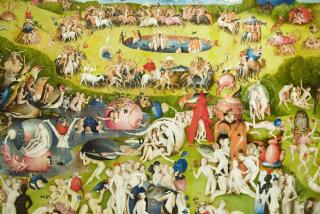‘Total Oblivion, More or Less’
- Share via
Macy Palmer would be living the life of a normal Midwestern 16-year-old girl, if only the Scythians hadn’t driven her family from their Minnesota home. Or perhaps the blame lies with the spreading plague, or the rival Imperial army -- it’s hard to say.
Exactly who or what is the cause for the chaos in “Total Oblivion, More or Less” is not as important as how it reshapes Macy’s world. She’s a smarter-than-average teenager with a mildly dysfunctional family. Her flirtatious older sister, Sophia, plans to skip traditional college and become a midwife, not exactly the path their father, an astronomy professor, might have chosen. Her younger brother, Ciaran, enrolled in classes for troubled children, has a sinister intelligence. Her mother drifts through days, particularly after discovering that she’s pregnant again.
Like many teenagers, Macy is becoming a person in her own right, even as she tries to reconcile herself to the family she comes from. But she’s also got to deal with a radically changing landscape -- recognizably suburban at first, its order is soon breaking down incomprehensibly. Mechanical devices, including watches, cars and guns, cease to function one by one. There is no radio or televisions, and newspapers are reduced to rune-like broadsheets. The invaders speak in archaic tongues.
The Palmers are herded by the Imperial forces into a refugee camp on an island near St. Paul. People are hungry, thirsty and dirty; they carry their few remaining valuables.
In some ways, this is a classic post-apocalyptic scenario. With the everyday suddenly gone, the narrator must find resources to navigate a strange and difficult world. In other ways, the plight of helpless refugees in America evokes those stranded by Hurricane Katrina -- and, further from home, people displaced by famine, disaster and war.
Before there’s time for the allegory to sink in, a letter arrives from a university in St. Louis, inviting Macy’s father to teach there. Hoping a more intact version of civilization lies downriver, the family secures passage. It takes everything they have -- including Ciaran’s morally questionable assistance and Sophia’s way with soldiers -- to get aboard a boat heading down the Mississippi.
The river is safe, but the shores are not. As if time has telescoped, decay is everywhere: malls are subsumed by forests, docks have disintegrated, empty buildings crumble. Violence threatens. And the farther south they go, the worse the plague.
As gloomy as this sounds, author Alan DeNiro has a gift for finding humor in his dark scenarios; Macy never loses her wisecracking teenager perspective. “I wasn’t sure if I was more freaked out by the fact that I could have been exposed to the plague, or that I had a ten-minute crush on my sister’s boyfriend before he went under,” she thinks. She and her family are forced apart, and it falls to Macy, who is just as inclined to get stoned with a friend as to tend to her mother, to bring them back together.
The world Macy moves through is wildly imaginative. The plague, carried by wasps, is both life-threatening and terrifically creepy. The Imperials, Scythians and Visigoths play out ancient rivalries across the U.S.; giraffes and elephants are used as work animals. An American elite collaborates with the new ancient powers, while word comes of outnumbered rebels in distant states.
But (and it’s not giving anything away to share this) these pieces don’t come together. In classic science fiction, there is a why -- what happened to make the world this way? -- but the elements of this story never cohere. Macy isn’t in pursuit of a synthesis of the fantastical elements around her; she’s just trying to reunite her family in a world she grasps only at the edges.
This is an attribute of the genre “slipstream” fiction. Coined by Bruce Sterling in 1989, it has gained momentum, with writers Aimee Bender, Kelly Link and George Saunders dipping in and out of its waters. Vaguely defined as making the reader feel strange, slipstream often mixes elements of fantasy and science fiction with literary fiction in ways that are uncomfortable, seeding impossible contradictions or leaving central questions unexplained. DeNiro, a Minnesota poet with one short-story collection behind him, enters the slipstream with “what ifs” that are as informed by Herodotus as they are by Huck Finn and Hardees.
Macy’s adventure is engaging and absorbing, but it doesn’t make much sense. For those conditioned to the logic of classic science fiction, “Total Oblivion’s” rule-breaking can be frustrating. But readers who are willing to let go will be swept away.



